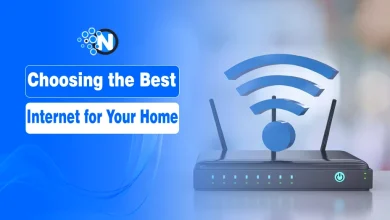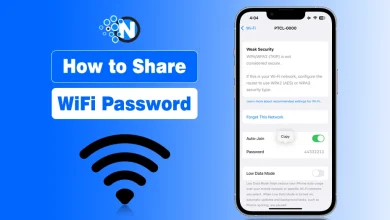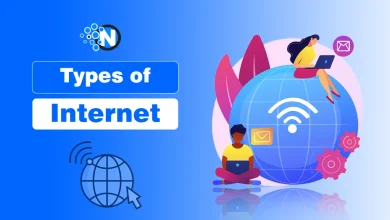A Home-Based Worker’s Guide to Choosing the Right ISP

With its flexibility and ease, the work-from-home revolution has changed the lives of many people. However, a dependable internet connection is essential to remote workers’ productivity, it’s not only a benefit. Imagine trying to attend an important video call that keeps buffering or having a deadline coming while your internet keeps dying. A poor internet service provider (ISP) can be a productivity killer in today’s digital world.
How can you go through the myriad of options available to you and select the ideal one for your needs when working from home? This in-depth guide will provide you with the steps you need to make a wise choice.
Choosing the Right ISP as a Remote Worker
1- Assessing Your Needs
Consider your unique internet consumption for a moment before stumbling into a plethora of internet plans and providers. Knowing what you need will help you choose the best solution. Here are some important things to think about:
Upload and Download Speeds: Dial-up internet is a thing of the past. A strong connection is necessary for modern business tasks including internet collaboration, cloud storage access, and video conferencing. Upload speeds are just as vital for delivering big files and having seamless video conferences as they are for receiving information. Find out what the minimal bandwidth needs are for the programs you use most frequently. Sending high-quality video requires upload speeds of at least 3.0 Mbps, according to well-known video conferencing services like Zoom.
Data Usage: Do you frequently download large files, upload project films, or spend the majority of the day in video chats as a data-hungry professional? If so, your only hope may be an unlimited data plan. Capped data plans can be a significant trap, resulting in surprise throttling (slowing down your internet) when you approach the data limit, as well as annoying overage costs.
Reliability and Uptime: Regular internet failures can cause productivity disruptions and time loss in addition to being annoying. Ask prospective ISPs about their uptime assurances during your interview. Seek out suppliers who have a track record of dependability and little downtime.
Customer Service: You will inevitably run into technical issues. Imagine having a broken internet connection right before a crucial deadline. Customer service that is courteous and responsive can make the difference between a small hiccup and a significant loss in productivity. Depending on your preferences, pick an ISP that offers phone, online chat, or email help and has a stellar reputation for providing exceptional customer service.

2- Researching Your Options
Now that you’ve determined exactly what you need for internet service, it’s time to look into the local ISP choices. Now is the time to put in some effort:
Examine Local Providers: It’s not always the case that national brands are the best option. Local ISPs can provide more individualized attention, superior customer service, and competitive costs.
Use Online Resources: You may compare internet plans, speeds, and prices from several ISPs operating in your area by typing in your zip code on a number of comparison websites. These websites frequently include user ratings and reviews, which provide insightful information about actual customer experiences.
Ask for Advice: Consult friends or coworkers who also work from home. They can share their experiences and may have insightful knowledge about the ISPs they use.
3- Beyond Speed and Price, Look for Additional Features
Although cost and speed are unquestionably important considerations, take into account these other aspects as well, since they can greatly improve your experience working from home:
Data Caps and Throttling: As previously indicated, data caps may be a significant disadvantage. To prevent unforeseen slowdowns, look for ISPs that provide unlimited data plans or plans with high data caps. After you use up all of your data allotment, some ISPs may limit your internet speed, making it unbearably difficult to do even simple tasks.
Static IP Addresses: You may need a static IP address if your job entails running a website or if you need to access your work computer remotely. Unlike dynamic IP addresses, which are assigned by the majority of ISPs and are subject to periodic changes, static IP addresses are fixed. Find out from your employer if this is a prerequisite for the job.
Business-Class Packages: Certain ISPs offer business-grade internet plans with features like priority customer care and service level agreements (SLAs) in order to expressly appeal to businesses. A specific uptime and response time in the event of an outage are guaranteed by these SLAs. Business-class packages can reduce downtime and offer peace of mind, even though they are frequently more expensive than residential plans. This is especially necessary for professionals who depend significantly on constant internet connectivity. Discover lesser-known features and benefits offered by https://ispreports.org/high-speed-internet-near-me/ and learn how to take full advantage of them to supercharge your home-based work.
4- Making the Final Decision
It’s time to investigate more when you’ve narrowed down your list of potential ISPs. Try getting in touch with the suppliers directly. Unpublicized promotional prices or bundle deals may be available from certain ISPs. These are some important queries to pose when conducting your research:
Guaranteed Minimum Speeds: Never accept ambiguous promises. Verify the lowest download and upload speeds you should anticipate during busy times. This is important information, particularly if there are times when your home has a lot of internet traffic.
Installation Fees and Equipment: Consider one-time installation expenses as well as recurring equipment rentals, such as modems and routers. While some ISPs may demand a separate rental agreement, others may provide bundled packages that include equipment rentals in the monthly charge.
Contract Terms and Early Termination Fees: Be aware of the length of the agreement and the consequences of ending it early. While some ISPs let you sign up for month-to-month contracts, others tie you down for a certain amount of time, usually one or two years. Make sure the contract meets your needs because early termination penalties can be expensive.
Data Usage Tracking Tools: Find out what tools the ISP offers for tracking data usage. You can monitor how much data you use and stay within data caps with the aid of these programs. In addition, some ISPs provide the ability to buy more data blocks as needed.
Conclusion
Selecting the ideal ISP is an investment in the success of your work-from-home job. You will have the necessary tools to make an informed choice if you adhere to the instructions provided in this guide. Remember that there isn’t a solution that works for everyone. Sort the features based on importance for your working style and financial constraints. You can succeed in your work-from-home setting and navigate the digital world with confidence if you have a strong and dependable internet connection.




